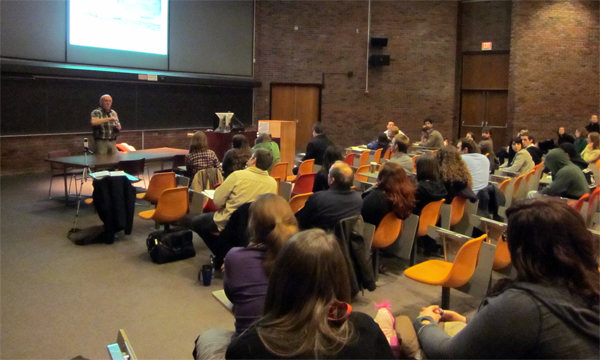

The well-known theory about the extinction of dinosaurs is that an asteroid collided with the Earth and completely wiped them from existence. However Gordon G. Gallup Jr., a professor from SUNY Albany, brought forth an additional theory at the fifth Evolutionary Studies (EvoS) Seminar on Monday, March 14 titled, “The Demise of the Dinosaur: A Biotic Crisis or a Biotic Revenge?”
During the continuing series developed by members of the EvoS Program, Gallup said there was evidence found that dinosaurs actually began to die off gradually over a period of 12 to 14 million years. This evidence led to the development of his theory that something else might have played a part in the extinction of dinosaurs.
Abigail Kurtz, a fourth-year psychology major and one of two EvoS assistants who helped coordinate the seminar, said the series has provided a wealth of knowledge by featuring many speakers known for conducting research relevant to evolution.
“The great thing about the EvoS lecture series is the variety of speakers invited and topics covered,” Kurtz said. “These speakers, who are experts in the interdisciplinary field of evolution, are invited to our campus to share their theories with students, faculty and community members.”
Gallup said the lack of robust taste aversions were the contributing factor to the demise of the dinosaurs. In order to explain taste aversions to the audience, Gallup related it to a humans’ experience with hangovers—titling it the “first-drunk phenomenon.”
Dr. Gordon Gallup Presents At SUNY New Paltz from Andrew Wyrich on Vimeo.
This phenomenon states that humans develop a robust learned taste aversion even if they pass out before getting sick from drinking. Gallup said the taste and smell of what made humans sick will always cause nausea because the body will recognize it. However, the ability to drink other alcoholic beverages remains unaffected.
Gallup’s theory on the extinction of dinosaurs suggests that they were incapable of developing this learned taste aversion when it came to toxic plants or angiosperms. After awhile, they gradually became extinct because they ingested a lethal dosage of these plants. Some audience members wondered how carnivorous dinosaurs became extinct if they didn’t depend on plants.
“Well the carnivorous dinosaurs depended on the herbivorous dinosaurs,” Gallup said. “So if the herbivorous were being wiped out because of the lethal dosage of toxic plants, then the carnivorous dinosaurs were gone too.”
From the beginning of the lecture, Gallup made an effort to engage the audience by using a cordless microphone rather than remaining stuck to the podium. He also added a few jokes and humorous photos, which resulted in sudden bursts of laughter from the audience.
Students lined up outside CSB 110 to get into the reception after the seminar. EvoS Director Glenn Geher’s said he hoped students could use evolution as a powerful tool of understanding.
“This was not only the first lecture about dinosaurs,” Geher said. “but also the first one to bridge the gap between psychology and paleontology.”
Students were eager to know more about Gallup’s theory and asked him questions at the end of the lecture. Leah Manders, a fourth-year anthropology major, said she enjoyed the lecture because she was captivated by Gallup’s engaging personality and his informative discussion with the audience.
“To me, his main hypothesis was that dinosaur extinction isn’t just what you’ve learned from kindergarten,” Manders said. “It wasn’t as instantaneous as we were taught.”
Gallup said he hopes students will begin to think outside of the box instead of simply taking someone else’s word.
“That’s the only way science will progress,” Gallup said. “Otherwise, people will continue to pursue the same questions that other people have asked in the past. People should use their ability to ask new questions, all from different perspectives.”
